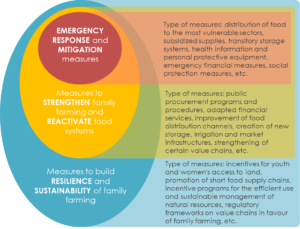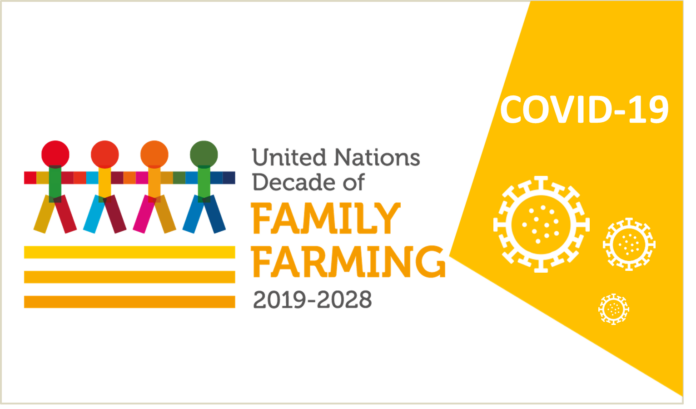In the crisis generated by the COVID-19, strengthening Family Farming should be a priority more than ever.
Covid-19 has highlighted the urgent need for countries to have local food systems that are resistant to global and local shocks and has highlighted the fragility of many agricultural systems, previously threatened by food insecurity.
The Covid-19 crisis is affecting women and men family farmers, who are particularly exposed to the effects of pandemics, in a very important way. Family farmers are facing difficulties in accessing inputs for production (shortages in the supply of agricultural inputs and increases in the prices of some inputs and fuels); temporary movement restrictions hinder their access to markets, generating in turn problems for the conservation of those unsold products (lack of refrigeration and storage systems); furthermore, their access to markets may be diminished due to changes in consumers’ behavior, the closure of agricultural markets and other marketing channels, such as public purchasing programs (schools, hospitals, etc.). Family farmers are, in most cases, among the most vulnerable population. However, since they are not part of the registries and databases, many family farmers are not receiving any kind of social support.
But at the same time, family farmers have been on the front line since the beginning of the crisis, ensuring consumers’ access to quality, healthy food. Family farming guards 75% of the world’s agricultural resources and produces 80% of the food (Putting Family farmers First to Eradicate Hunger. FAO, 2019).
Therefore, considering the indubitable link between food and family farming, the Covid-19 crisis brings to the table the urgent need to strengthen local food systems and means based on family farming.
The United Nations Decade of Family Farming (UNDFF) 2019-2028 is a concrete instrument to define short, medium and long-term measures and actions that improve the resilience, sustainability, inclusiveness and viability of family farming and offers a collaborative framework facilitating the implementation of these measures.
It is worth remembering the Vision Statement on which the UNDFF Global Action Plan is built:
“A world where diverse, healthy and sustainable food and agricultural systems flourish, where resilient rural and urban communities enjoy a high quality of life in dignity, equity , free from hunger and poverty.
Family farming is essential to achieve this vision”.
The UNDFF Global Action Plan envisages 100 National Action Plans on Family Farming developed by governments in dialogue with family farmers’ organizations and/or with National Committees of Family Farming by 2024. It sets out also the target of 5 Regional Action Plans and 7 sub-regional Action Plans on Family Farming.
It is time to accelerate the implementation of the UNDFF and the development of National and Regional/sub regional Action Plans on Family Farming in dialogue with family farmers’ organizations and/or with National Committees of Family Farming.
National and Regional/sub regional Action Plans of the Decade of Family Farming in response to the COVID-19

Walking towards more sustainable, inclusive and resilient food systems to face new crises.
Download this article as a document.


